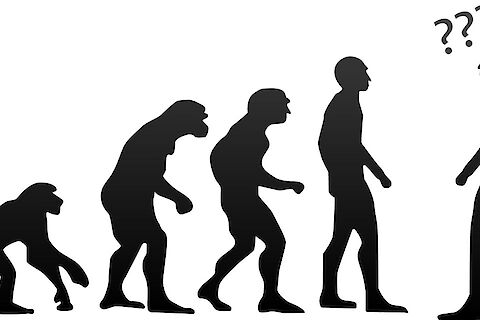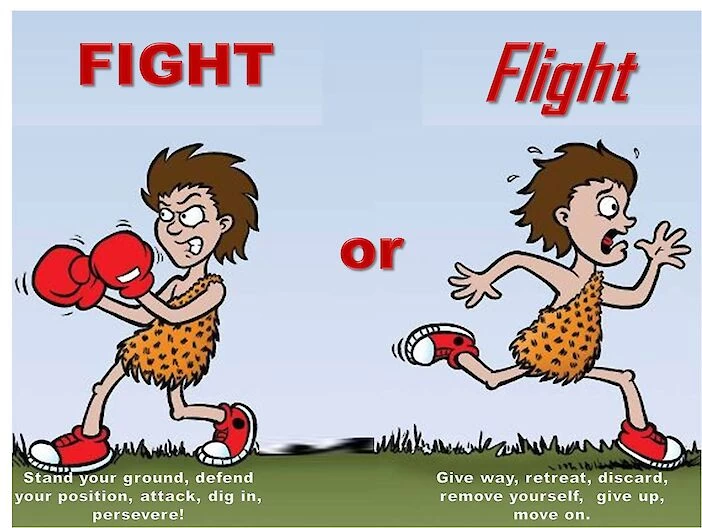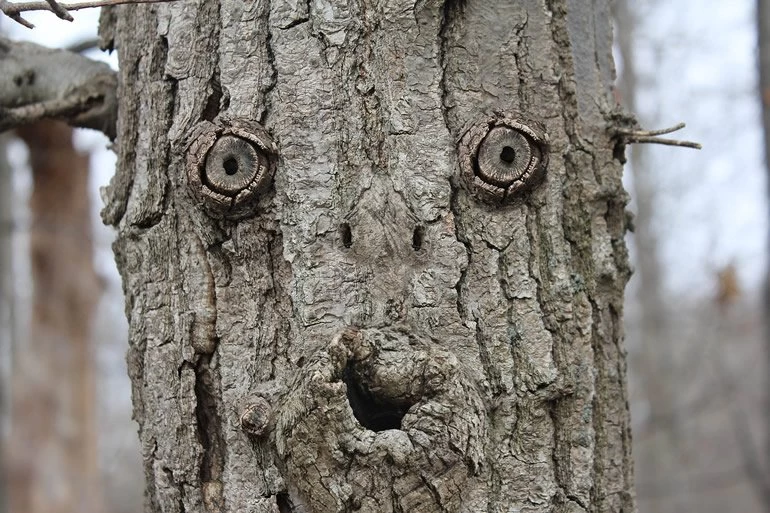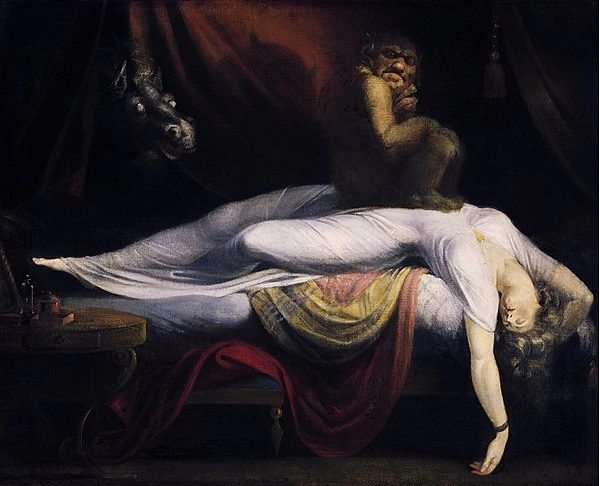

Is it our instinct to believe in the paranormal?
Our brains are complicated. Science still doesn't know entirely what the brain is capable of. Many believe that certain human behaviours are 'hard-wired' as a result of evolution. It is a concept called evolutionary psychology.
What is evolutionary psychology?
Evolutionary psychology is a controversial topic and one up for much debate. It is a theoretical approach to psychology that attempts to explain some behaviours and psychological traits. It is inspired by the work of Charles Darwin which applies his idea of 'natural selection'. It looks at evolution and how it has shaped the way we operate.

This is what makes it somewhat controversial. It is a survival of the fittest mentality. Evolutionary psychologists believe that the human mind has evolved in a way to benefit the individual.
Psychologists have recently applied Darwin's theory in explaining how the human mind evolved to benefit the individual. From this point of view, complex aspects of human behaviour and experience - including language, memory, and consciousness - all evolved because of their adaptive fitness. In one way or another, these features promoted survival and propagation of the human species.
https://www.bbc.co.uk/science/humanbody/mind/articles/psychology/psychology_5.shtml
The pressures to procreate and survive made people change their behaviours throughout time. Everything from jealousy to the way we interact with others is said to be shaped in part by the survival of our ancestors. It is also where the fight or flight response is said to have developed.
Fight or flight
When your brain feels like you are in some sort of danger where it feels that you are at risk of harm or attack, it goes into what is called 'hyper-arousal' or 'acute stress response'. It is otherwise known as 'fight or flight mode'. The brain releases different hormones that prepare your body to either run for your life or to stay and confront and fight the threat. It was first described in the 1920s by Walter Cannon who was an American physiologist. What is interesting with this is that it is triggered when the brain feels you are at threat. It may be a very real physical threat or it could be imaginary. We all have different fears and different tolerance levels which is why this mode is extremely personal. What may set one person off, may not bother another person at all. Some people will stand and confront the fear ready to fight and your body has the adrenaline ready with extra energy and strength to help you do so. Others will instinctively run away, and again they have the extra energy and lots of oxygen to help them do that. It all happens within a split second and everyone reacts differently. This instinct is said by some to be a trait of evolutionary psychology.

Image Source: Release your voice
This demonstrates to us that underneath we are still different. In the same way that some people will run and some will stay to fight, there are some who believe in god and some who do not. There are some who believe in the paranormal and there are some who do not. Are we hard-wired to believe in the paranormal? Scientist Nicholas Humphrey's research indicated that it was natural selection that gave humans what we consider to be a soul.
Human beings have a self that seems to inhabit a separate universe of spiritual being. As the subjects of something so mysterious and strange, we humans gain new confidence and interest in our own survival, a new interest in other people, too. This feeds right back to our biological fitness, in both obvious and subtle ways. It makes us more fascinating and more fascinated, more determined to pursue lives wherever they will take us. In short, more like the amazing piece of work that humans are.
Nicholas Humphrey
It suggests that the very concept of consciousness was developed by humans over time as a way to survive. Consciousness itself is defined as awareness. A person needs this awareness in order to understand what is happening in the minds of our peers so that we can manipulate them and they can manipulate us. While the word manipulation sounds quite invasive, that is in a sense what we are doing. When we want to comfort someone, for example, we speak to them using a soft tone and use human touch to console them. This is a behavioural interaction that has been learned over time.
So when we look at the paranormal, we have to wonder if we have been conditioned to believe in the paranormal. Let's look at the different things that it seems our brains are 'hard-wired' to do which have a link to how we perceive the paranormal.
Cognitive Bias
A cognitive bias is an error in the way that we think. It means we are not necessarily thinking with a 'clear mind'. Our experiences, our beliefs, and our intentions all influence the way we think, the way we make decisions, and the way we interpret our surroundings. Just the fact that we believe in the paranormal makes us biased. It means we are more prone to 'self-fulfilling prophecy' where our brain is likely to interpret certain things to be paranormal when they are not. We go in looking for the paranormal and our 'brain' makes us find it even if it is not really there. On the other end, a full skeptic is also biased and will tend to look for a rational explanation discounting any sort of ambiguous event without even looking into the possibility it could be something we don't quite understand. There are over 50 different bias that affects the way that we think.
They can make us see patterns or connections in random events, they can make us miss something right in front of us, they can make us remember things differently. I have linked a list of different articles I have written on specific cognitive biases and how they apply to the paranormal at the bottom of this article.
Pareidolia
Let's look at pareidolia for example. This phenomenon is a form of apophenia which is where the brain tries to make sense out of patterns of data. It is thought that this psychological phenomenon was a form of survival that we have inherited from our ancestors in what is a typical example of evolutionary psychology.
"As soon as the infant can see, it recognizes faces, and we now know that this skill is hardwired in our brains. Those infants who a million years ago were unable to recognize a face smiled back less, were less likely to win the hearts of their parents, and less likely to prosper."
Carl Sagan
The Demon Haunted World 1995

Image Source Public Domain
If a baby did not recognize its parents, it would interact and smile less. It is thought that the brain was 'wired' to recognize the faces to be able to form bonds with its parents. When your child sees your face, it often lights up with a smile, even from those early weeks. The brain was trained to recognize faces.
Parasomnias
A parasomnia is something out of the ordinary that a person experiences while they are asleep. It often 'runs in the family' and children can often grow out of these disorders such as sleepwalking and night terrors. Sleep Paralysis also falls under this category. As the people experiencing parasomnia often display odd behaviour or seem terrified by their experience, they are often attributed to something paranormal.
When we sleep, we go through 5 stages of sleep. 4 of these are considered to be NREM - nonrapid eye movement, with the final stage, labelled as REM sleep - rapid eye movement. We can dream during any cycle of sleep, but it is most common and most vivid during REM sleep. It is believed that we have between 4-6 dreams every night, we just don't always remember them. Quite often, it is during this REM sleep, that these parasomnias often occur. One of the most common parasomnias associated with the paranormal is sleep paralysis.

John Henry Fuseli - The Nightmare Image Source: Public Domain
Sleep paralysis occurs when a person is in REM sleep - Rapid Eye Movement. It is in this state that the brain has vivid dreams. It also sends a message to your muscles to relax which puts you in a state of temporary paralysis so that you don’t go and start physically acting out what you are dreaming. If you dream of punching someone, you don’t want to be punching your partner in your sleep - or if they snore as mine does maybe you do! Sometimes a person wakes up and becomes conscious before the brain sends the signal to the muscles to wake up. It means a person is lying there and is conscious but is unable to move and unable to speak. It is common to hallucinate in this state as well as you are still technically in REM and some people report seeing figures in their room or at the foot of the bed. They can feel a heaviness on their chest or a choking sensation which makes you feel like it is the figure at the foot of the bed doing this to you. It doesn’t take long for the body to catch up, but it can feel like an eternity when you are in this state. It is absolutely terrifying. It is called sleep paralysis. It can occur if someone is sleep-deprived, stressed, on certain medications or if they suffer from other sleep disorders such as narcolepsy or sleep apnea. People often associate this with what they consider negative spirits and feel it is a form of psychic attack.
Are we hard-wired to believe in the paranormal?
Many researchers seem to suggest that certain personality traits make a person more prone to believing in the supernatural. These personality traits could be a result of evolutionary psychology. A lot of what we view about the paranormal comes down to our perception. Two people can be standing in a room and witness or experience exactly the same thing. One person could interpret it as being paranormal. The other person could interpret it as being something explainable. When we look at the above, a lot of how the brain reacts and processes information in a lot of ways seems like it is out of our conscious control as is done on a subconscious level. Belief and perception of course are different. Belief is the root or foundation of our way of thinking. You could say the belief is our hard wiring. Our perception is the method and the way that we think or view the World. This evolutionary hard-wiring (belief) along with the way we have been raised, our cultural influences, and our own human experiences (perception) helps to complete the circuit. that shape the way we view the world. This in turn helps shape the way we perceive the paranormal and why people think of it in different ways.
Our brains are quite complicated, yet while we look to Science, it cannot give us all the answers. Perhaps part of our evolutionary behaviour is to seek answers for the things that we cannot explain? Maybe when we are researching the paranormal we need to expand the way we approach it. While we are focusing our attention on the paranormal itself, maybe we need to look at the human component? In particular, if those with different views work together to understand why there are these differences in perception it could be another piece of the giant puzzle we are trying to solve.
Here are a collection of articles I have written about different cognitive biases and the paranormal
Clustering illusion or synchronicity?
The anchoring effect & the paranormal
The observer effect & the paranormal
Classical conditioning & the paranormal
Perceptual bias & the paranormal
The Narrative Fallacy - Turning paranormal investigations into ghost stories?
Blind spot bias & the paranormal
Inattentional Blindness & the paranormal
References:
https://www.theguardian.com/science/2006/jul/29/politicsphilosophyandsociety.books
https://www.newscientist.com/article/mg14820035-000-natural-born-believers/
https://www.psychologytoday.com/au/basics/evolutionary-psychology
https://www.bbc.co.uk/science/humanbody/mind/articles/psychology/psychology_5.shtml
If you enjoy LLIFS, consider buying me a book (otherwise known as buy me a coffee but I don't drink coffee and I LOVE books). Your donation helps to fund the LLIFS website so everyone can continue to access great paranormal content and resources for FREE!

Top pages with similar subjects
Don't forget to follow the Facebook page for regular updates
Join the mailing list to receive weekly updates of NEW articles. Never miss an article again!
Buy the latest and past issues Haunted Magazine
Check out the books written by LLIFS